What a Parisian massage really feels like
You’ve walked the Seine, eaten buttery croissants, and stared up at the Eiffel Tower. But have you truly let Paris sink into your skin? A massage in Paris isn’t just about kneading tight muscles-it’s about slowing down, breathing deeper, and letting the city’s quiet elegance wrap around you. This isn’t a quick spa treatment you’d get at an airport. This is a ritual. A moment where the rhythm of Paris-soft street music, the clink of espresso cups, the scent of lavender from a nearby boutique-becomes part of the therapy.
Why Parisian massage is different
Most places treat massage like a service. Paris treats it like an art. Here, therapists don’t just follow a checklist of strokes. They read your body. They notice how you hold your shoulders, how your breath changes when they press just right. Many are trained in French osteopathy or traditional European techniques that blend deep tissue work with gentle, flowing movements. You won’t find the aggressive pressure of a Thai massage or the loud music of a chain spa. Instead, expect silence-except for the faint hum of a French jazz record or the rustle of linen sheets. The oils? Often organic, locally sourced lavender or chamomile from Provence. The room? Dim lighting, maybe a single candle, and walls painted in soft beige or sage green. This isn’t luxury for show. It’s luxury for restoration.
Types of massage you’ll find in Paris
- Swedish massage - The classic. Long, smooth strokes to melt away stress. Perfect if you’re new to massage or just need to unwind after sightseeing.
- Deep tissue massage - For those who’ve been on their feet all day in Montmartre or carrying a backpack through the Louvre. Targets knots in shoulders, neck, and lower back.
- Thai massage - Less common, but you’ll find it in the 10th and 11th arrondissements. Involves stretching and pressure along energy lines. No oils. You stay clothed.
- Hot stone massage - Warm basalt stones placed along your spine and between your toes. Feels like being hugged by sunlight.
- Shiatsu - Finger pressure on meridians. Popular among expats and yoga lovers in Le Marais. Calms the nervous system without any oil.
- French lymphatic drainage - A hidden gem. Light, rhythmic touches to reduce puffiness and boost circulation. Ideal after a long flight or too much wine and cheese.
Where to find the best massage in Paris
You don’t need to book a five-star hotel spa to get an authentic experience. Some of the best sessions happen in quiet, unmarked doorways. In the 6th arrondissement, look for small studios near Rue de l’Abbé de l’Épée-no signs, just a bell. In Le Marais, head to Rue des Rosiers, where a handful of therapists offer 90-minute sessions in converted 18th-century apartments. If you’re near Saint-Germain-des-Prés, try Le Spa du Bonheur a discreet, highly rated studio known for its personalized touch and use of organic French botanicals. In the 15th, near the Eiffel Tower, La Maison du Bien-être offers private rooms with views of the Seine and therapists who speak English, German, and Japanese. Don’t overlook the hidden gems in Belleville or the 19th-many therapists here are trained in Lyon or Marseille and bring regional techniques to the capital.
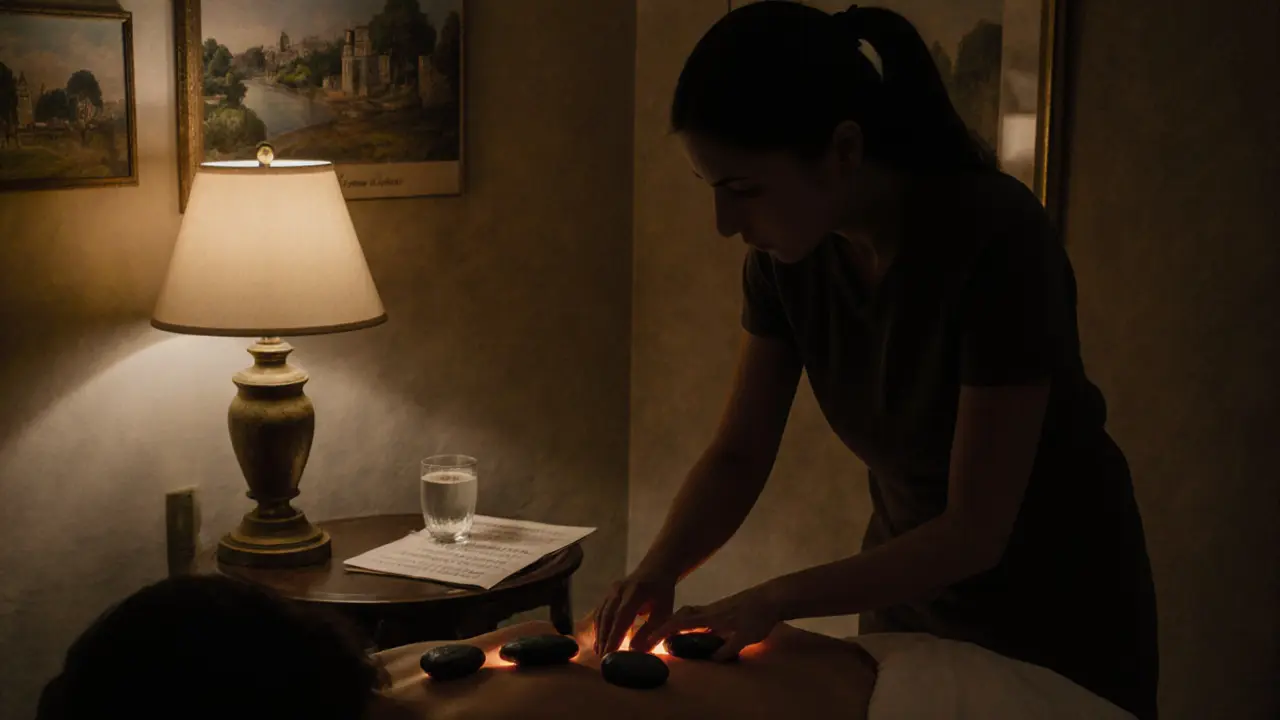
What to expect during your session
Arrive 10 minutes early. You’ll be offered herbal tea-probably chamomile or mint-and asked about your stress points. No one will rush you. The therapist will leave the room while you undress and get under the blanket. The room will be warm, not hot. The lights will be low. You’ll hear soft music, maybe a piano piece by Debussy. The massage begins slowly-feet, then calves, then back. Each movement is deliberate. There’s no talking unless you start it. You might drift off. That’s fine. When it’s over, you’ll be given a glass of still water and a warm towel. No one will push you to buy a package. No upsells. Just quiet gratitude. And maybe, just maybe, you’ll walk out feeling lighter-not just physically, but emotionally. Like you’ve shed a layer of the city’s noise.
Pricing and how to book
Expect to pay between €60 and €120 for a 60-minute session. Higher-end spas in the 8th or 16th arrondissements might charge €150+, but you’re paying for the location, not necessarily better technique. Most independent studios charge €80-€95 for 75 minutes. Booking is simple: most use platforms like SpaBooker or Doctolib, or you can call directly. Many therapists don’t have websites-just Instagram accounts with photos of their rooms and client testimonials. Search for "massage Paris" + your neighborhood. If you’re staying in a hotel, ask the concierge for a recommendation. They often know the quiet, trusted spots that don’t advertise online. Avoid tourist traps near the Champs-Élysées or Notre-Dame. Those places charge €100+ for a 30-minute session with a rushed therapist who’s seen 12 people before you.
Safety tips for your massage in Paris
- Always confirm the therapist’s credentials. Look for titles like Massothérapeute Diplômé-this means they’ve completed 2,200+ hours of training.
- Never pay upfront in cash without a receipt. Legitimate places issue invoices with their business name and address.
- Avoid places that offer "sensual" or "erotic" massage. These are illegal in France and often scams.
- Check reviews on Google or TripAdvisor. Look for mentions of hygiene, professionalism, and language skills.
- If you have allergies, ask about oils and lotions. Many places now use organic, fragrance-free options.
- Don’t feel pressured to tip. It’s not expected, though a small thank-you note is always appreciated.
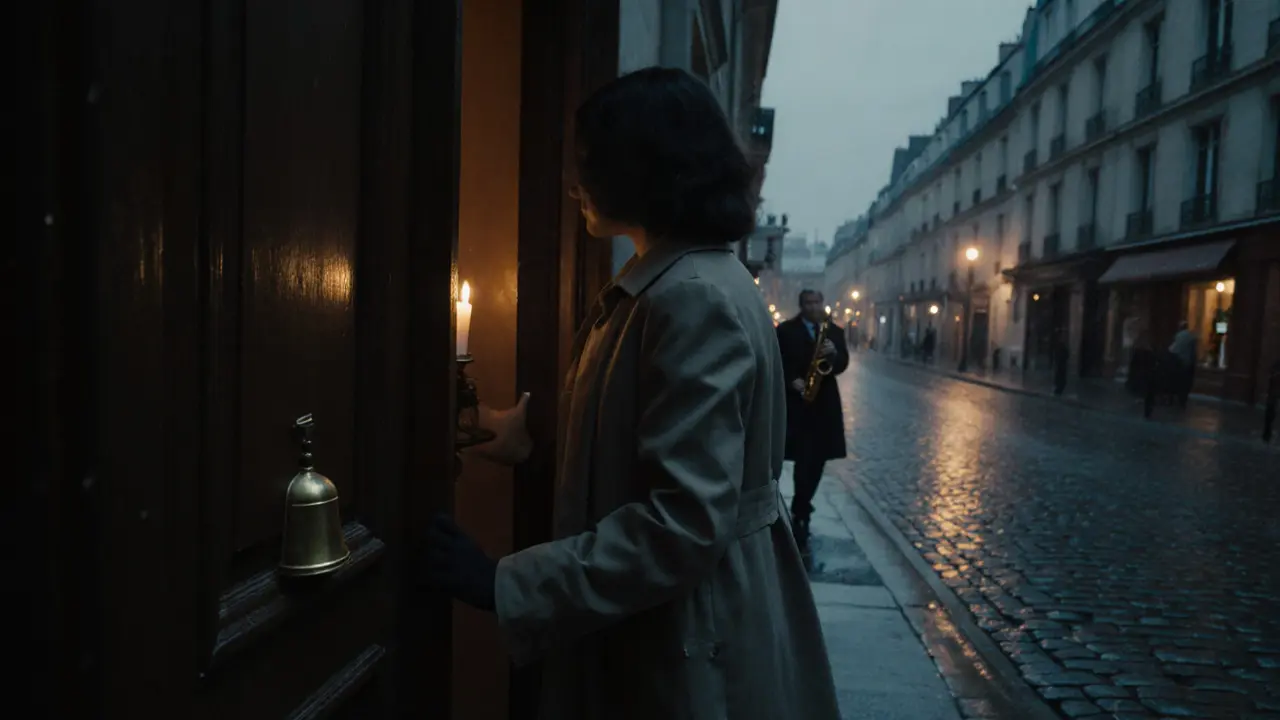
Massage in Paris vs. Other European Cities
| Feature | Paris | Barcelona | Amsterdam | Rome |
|---|---|---|---|---|
| Typical session length | 60-90 minutes | 60 minutes | 60 minutes | 60 minutes |
| Pressure style | Soft to moderate, fluid | Firmer, energetic | Light to medium, holistic | Deep, focused on tension |
| Environment | Quiet, minimalist, intimate | Vibrant, colorful, lively | Cozy, candlelit, natural | Traditional, ornate, historic |
| Use of oils | Organic, French botanicals | Often citrus or olive oil | Essential oils, aromatherapy | Herbal blends, Mediterranean |
| Language barrier | Most speak English | Many speak English | Most speak English | Less common |
| Booking ease | Easy via apps or walk-ins | Easy, many online | Very easy | Harder, often need referrals |
Frequently Asked Questions
Is it safe to get a massage in Paris as a tourist?
Absolutely. Paris has strict regulations for massage therapists. Look for places with a registered business license and therapists who hold the Massothérapeute Diplômé certification. Avoid any establishment that doesn’t have a clear address or seems to operate out of a private apartment without a professional setup. Stick to places with reviews, and never go alone to an unverified location.
Do I need to speak French to get a massage?
Not at all. Most professional massage studios in central Paris have staff who speak English fluently. Many also speak German, Spanish, or Mandarin. If you’re going to a smaller studio in a less touristy area, a simple phrase like "Je suis un peu tendu dans les épaules" (I’m a bit tense in my shoulders) goes a long way. But you won’t be lost in translation.
Can I get a massage if I’m pregnant?
Yes, and many therapists specialize in prenatal massage. Look for studios that mention "massage prénatal" on their website or booking page. These sessions use special pillows and gentle techniques to relieve back pain, swelling, and stress. Avoid deep tissue work in the first trimester, but light Swedish and lymphatic drainage are safe and deeply soothing.
How long should my massage be?
For first-timers, 60 minutes is ideal. It’s long enough to relax deeply but short enough to fit into a busy day. If you’re feeling particularly tight or stressed, go for 75 or 90 minutes. Many Parisian therapists offer extended sessions because they believe true relaxation takes time. Don’t rush it. This isn’t a checklist item-it’s a reset button.
Are there any hidden costs?
No, if you book with a reputable place. The price you see online or hear over the phone is the price you pay. Some places include tea, towel service, and use of their relaxation lounge. Others might charge extra for hot stones or special oils-always ask upfront. Avoid places that surprise you with a "service fee" or "tipping expectation." That’s not standard in France.
Ready to unwind like a Parisian?
Paris doesn’t rush. Neither should you. Whether you’re here for a weekend or a month, carve out one afternoon-just one-to lie still, breathe slow, and let someone else hold the weight for you. You’ve seen the art, tasted the food, walked the bridges. Now let the city touch you in a way that lingers longer than any photo.

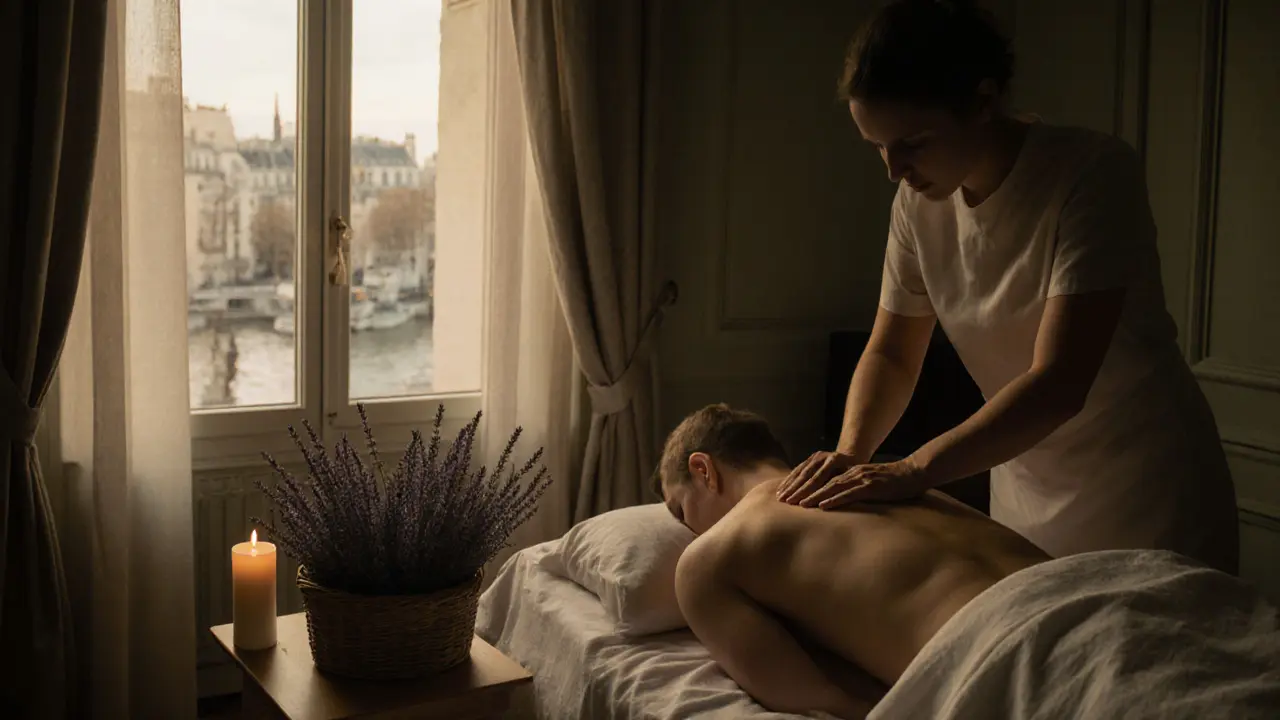
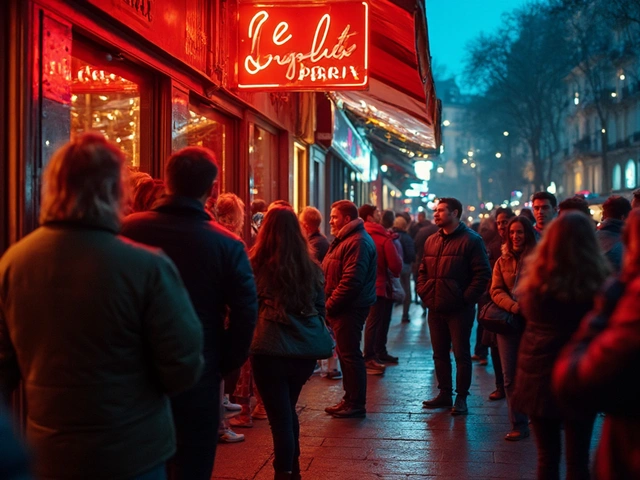

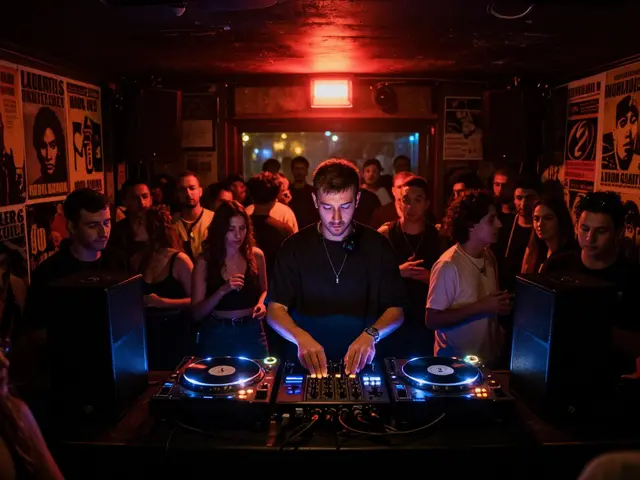
Ibrahim Ibn Dawood
November 9, 2025 AT 06:33Parisian massage is not an art-it’s a marketing gimmick wrapped in lavender oil and French jazz. Every city has massage. What makes this different? The price tag. You’re paying for ambiance, not technique. I’ve had better deep tissue in Delhi with a man named Raj who used coconut oil and a wooden roller.
Mia Peronilla
November 10, 2025 AT 03:04i just… i dont know man. like. the way they talk about the ‘quiet elegance’ and ‘rhythm of paris’-its like they’re writing a travel brochure for souls who’ve never felt real stress. what if you just… want to be pummeled? what if you dont care about debussy? what if your shoulders are screaming and you just need someone to crush them into submission? why does everything have to be a poem? 🤔
lady october
November 11, 2025 AT 20:30Let me guess-the ‘hidden gems’ are all fronts for human trafficking rings that use ‘massage’ as a cover. 🕵️♀️ Ever notice how every article like this never shows the back room? Or how the ‘independent studios’ with no signs are always in the same neighborhoods where the police ‘don’t patrol much’? And don’t get me started on ‘organic French botanicals’-that’s just a fancy way of saying ‘we’re charging you €90 for a bottle of lavender water from a Walmart in Lyon.’ They’re selling you a fantasy while your credit card gets drained. 💸
Saul Stucchi
November 12, 2025 AT 06:24This is beautiful. Truly. I just got back from Paris last month and I went to Le Spa du Bonheur-no idea how I found it, honestly, just wandered down a tiny alley and heard piano music. The therapist, Claire, didn’t say a word until the end, and then she just smiled and handed me a warm towel and said, ‘You needed this.’ I cried. Not because it hurt, but because I hadn’t felt safe enough to relax in months. Thank you for writing this. 🥹
Chase D
November 12, 2025 AT 16:21Okay but what if the whole ‘Parisian massage’ thing is just a CIA mind-control experiment? 🤯 They train therapists to use specific frequencies in their touch + Debussy playlists to induce passive compliance. You walk out feeling ‘lighter’? Nah. You walk out feeling *suggestible*. And the ‘organic lavender’? Probably laced with micro-dosed LSD from Provence labs. They’ve been doing this since the 70s. The Eiffel Tower? Also a surveillance node. 🌿👁️
Nina Khvibliani
November 14, 2025 AT 00:34Paris doesn’t just give you a massage-it gives you a *rebirth*. 🌸 The way the oil glides like liquid dusk over your skin, the silence that hums louder than any city noise, the way your breath finally remembers how to be slow… it’s not therapy. It’s alchemy. You’re not being kneaded-you’re being *unwritten* from the stress you’ve been carrying since childhood. And yes, I cried too. Not because it hurt. Because for the first time in years, I didn’t feel like a ghost in my own body. ✨
Rosanne van der Greft
November 15, 2025 AT 16:58Wow. So let me get this straight: you’re recommending a €90 session where you’re told not to talk, not to tip, and not to ask questions… but somehow this is ‘luxury for restoration’? 😒 Meanwhile, in the real world, people are working two jobs just to afford rent. This isn’t relaxation-it’s performative self-care for the wealthy. And the ‘hidden gems’? They’re just places that don’t have Yelp reviews because they’re too busy laundering money. 🤡